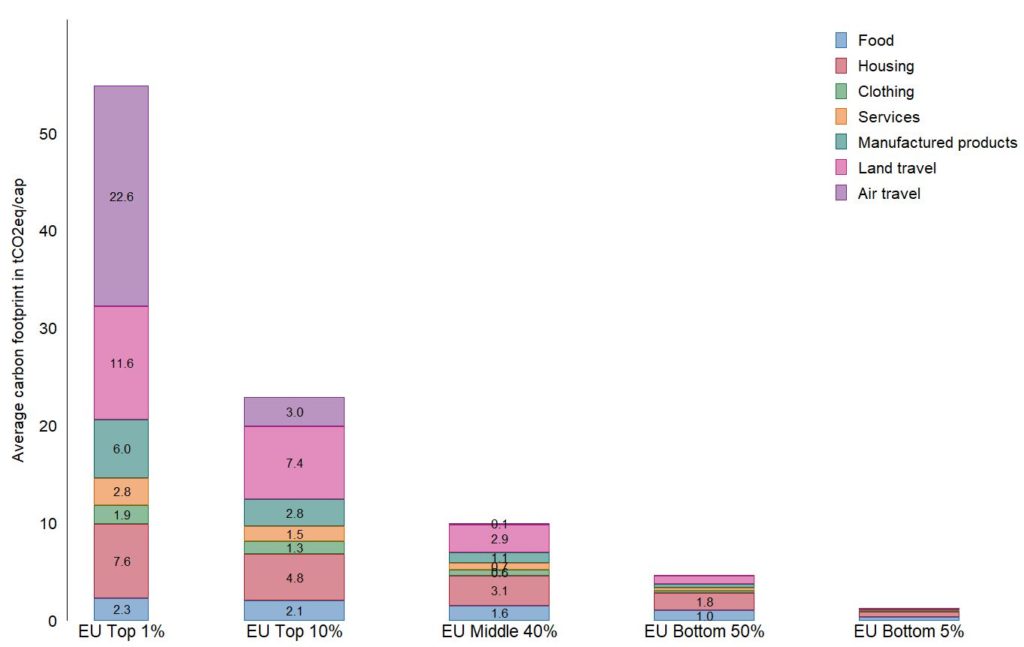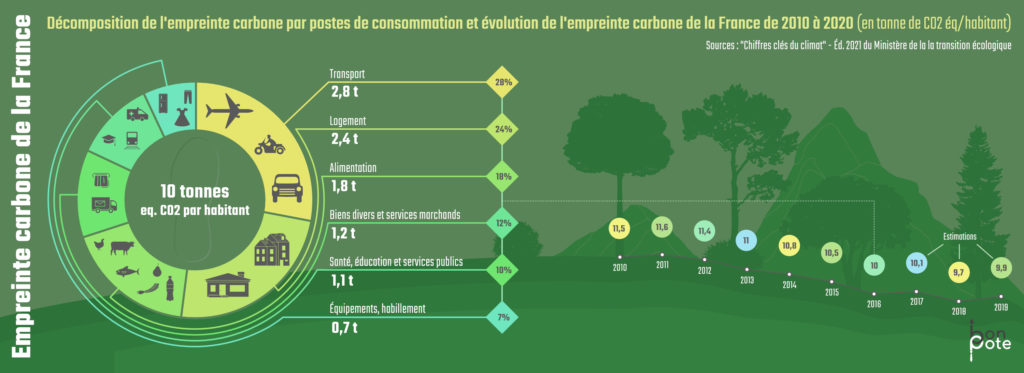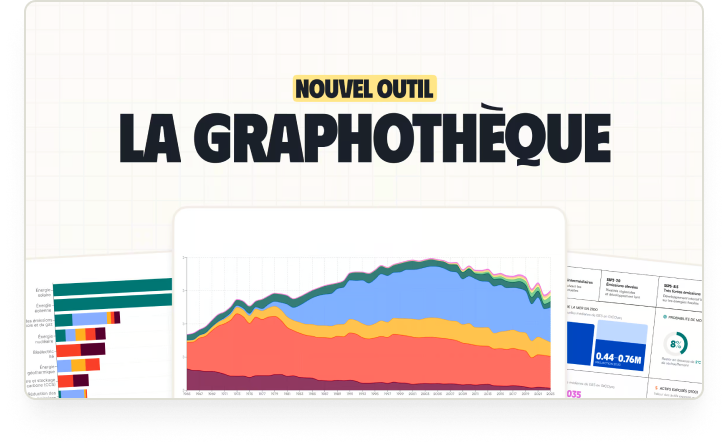It’s been two years since I started working on degrowth and the least I can say is that I don’t know a more overused term than this one. Every time I bring up the subject, the same criticisms resurface:
Oh yeah, we’ve seen what degrowth looks like in 2020′.
‘You want to be confined all year round is that it?’
‘ Great your society project, everyone with an oil lamp like the Amish!’
If you thought that things had changed in 2021, that the French were going to express themselves on a subject having done research beforehand and being intellectually honest, I have bad news:
If this were an isolated case, we could overlook it. The problem is that very influential people have exactly the same discourse, and are heard by thousands (if not millions) of people. I am of course referring to E. Macron who declared in front of the members of the Citizen’s Climate Convention ‘the choice of degrowth is not an answer to the climate challenge‘, to F. Lenglet who compares it to ‘A lockdowned economy‘ or to Luc Ferry who (in one of his 150 articles in the Figaro) is trying to sell us his infinite growth.
Rather than answering each person one by one, here are some clarifications on degrowth: what the literature tells us, and especially what it does not tell us.
What is degrowth?
Before going into detail about what degrowth tells us, it is important to provide a clear and concise definition. In the specialized literature, there are more than 70 definitions of degrowth. However, they all have the same objectives: to reduce production and consumption to limit social and environmental damage. If you had to pick just one, Jason Hickel’s is very clear:
Degrowth is a planned reduction in the use of energy and resources aimed at restoring the balance between the economy and the living world, in order to reduce inequalities and improve human well-being.
In our interview, Timothy Parrique gave his own definition which is more or less the same: a slowing down and narrowing of economic life in the name of sustainability, social justice, and well-being. It is indeed a revolution compared to the current economic system, based on a perpetual and disproportionate expansion that benefits only a minority.
Why is degrowth necessary?
Can we continue with the current system? The answer is no. Human civilization is currently exceeding a certain number of planetary limits and is facing a multidimensional crisis of ecological degradation, including ocean acidification, continued deforestation on a global scale, global warming that is already having impacts (including in France), and a collapse of biodiversity. These are indisputable factsthat are now well sourced in the scientific literature (notably by the IPCC and IPBES), and no longer really the cry of alarm of 2-3 ecological activists that a part of the media loves to mock.
What are the solutions to this problem? Some will tell you that we must continue this quest for perpetual growth and that the solution lies in green growth: a decoupling of GDP growth and its ecological impact.
So let’s remember an essential point: an absolute, NET and long term decoupling with -7.6% of CO2eq emissions/year (while keeping growth!) has never happened and will probably never happen. The constraints of both time (carbon neutrality in 2050) and carbon budgets, whether to limit warming to +1.5 or +2 degrees, make this green growth extremely unlikely.
Finally, the preservation of the environment and the climate is not only a matter of CO2. Dealing only with CO2 misses absolutely key elements for a sustainable and desirable society, such as the collapse of biodiversity (and all other relevant footprints) and other social indicators concerning inequality and poverty.
Without a technological miracle, only one option
Since, apart from a technological miracle that would make this green growth possible, the only way to respect the limits of carbon budgets is for rich countries to actively slow down the rate of production and consumption of materials. Again, this is not a fabrication but an observation from the IPCC report 1.5.
As Hickel rightly points out, it is important to clarify that degrowth is not about reducing GDP, but rather about reducing the flow. From an ecological point of view, this is what counts. Of course, this reduction in output is likely to lead to a reduction in the rate of growth of GDP, or even a reduction in GDP itself. This is what degrowth seeks to do: to move towards a sustainable society in the most just and equitable way possible.
Now that the definition is clear, let’s go back to the most recurrent criticisms. They are sometimes legitimate and it is important to clarify all the misunderstandings so that the idea is democratized and not limited to a debate between academics.
Degrowth or recession?
This is certainly the most common error: confusion between degrowth and recession. I read this error at least once a day. It’s not for lack of clarification of the two terms in July 2020, clarifying what a recession really is:
Your degrowth is actually called recession, or rather depression. Reminder: according to INSEE, ‘a country enters a recession when its GDP falls for at least two consecutive quarters’. Secondly, economic depression is defined as ‘a severe form of economic crisis. It consists of a significant and lasting reduction in production.
The reason we have two different words for recession and degrowth is simply that they are not the same thing. Recessions occur when growth-dependent economies stop growing. It is a catastrophe that ruins people’s lives and exacerbates injustice. Degrowth is a project for society and calls for a completely different type of economy. An economy that doesn’t need growth in the first place (while still being able to have it), and that can bring justice and well-being even if energy consumption decreases.
“COVID-19 made us experience degrowth!”
Many people have compared the recession and COVID-19 with degrowth, but the opposite is true. This is indicated by the work of Hickel, Kallis and Parrique published in 2020. Here is a non-exhaustive list of differences between degrowth and recession (Covid-19):
1- Degrowth is a planned and coherent policy aimed at reducing ecological impact, decreasing inequality and improving well-being. Recessions are not planned, nor do they aim at any of these outcomes. They are not intended to reduce ecological impact (although this may in some cases be an unintended result), and they are certainly not intended to reduce inequality and improve welfare.
2- Degrowth introduces policies to prevent unemployment and even improve employment, for example by shortening the work week, introducing a job guarantee with a living wage, and deploying retraining programs to get people out of declining sectors. Degrowth is explicitly focused on maintaining and improving people’s livelihoods despite a reduction in overall economic activity. Recessions, on the other hand, lead to mass unemployment and ordinary people lose their livelihoods.
3- Degrowth aims to reduce inequality and distribute national and global income more fairly, for example through progressive taxation and living wage policies. Recessions, on the other hand, tend to increase inequality. Again, the COVID crisis is an example. Intervention measures (QEs, corporate bailouts, etc.) have made the rich richer (especially to the benefit of asset owners), billionaires have added billions to their wealth, while the poorest have never suffered more. This is one of the reasons why I left my job at the end of the year.
4- Degrowth aims to develop universal public goods and services, such as health, education, transportation and housing, in order to make available the basic goods that people need to lead a prosperous life. Recessions usually involve austerity measures that reduce spending on public services.
5- Degrowth is part of a plan to achieve a rapid transition to low-carbon energy, restore soil and biodiversity, and reverse ecological degradation. During recessions, on the other hand, governments generally abandon these objectives to focus on stimulating growth, regardless of the environmental cost.
As we have obviously not yet seen the end of the pandemic and others are likely to follow (see IPBES), the above differences must be understood and the confusion must be stopped.
NEWSLETTER
Chaque vendredi, recevez un condensé de la semaine, des infographies, nos recos culturelles et des exclusivités.
+30 000 SONT DÉJÀ INSCRITS
Une alerte pour chaque article mis en ligne, et une lettre hebdo chaque vendredi, avec un condensé de la semaine, des infographies, nos recos culturelles et des exclusivités.
“The word degrowth is wrong”
Is the term ‘degrowth’ a problem in itself? Shouldn’t there be another term that would lead to less confusion? A nuanced and objective response to this is important. Criticism is not new and many research papers have already returned to the origin of the term and its development.
First of all, it is important to remember that degrowth is not the opposite of growth. Just because it is common to understand the word Growth as GDP growth does not mean that the word degrowth means GDP degrowth: it has nothing to do with it.
Secondly, it is indeed the word ‘growth’ that is the problem here. Instead of wanting growth at all costs, we should ask ourselves why we are chasing it. Indeed, it has not reduced inequality or poverty in France for 30 years (Piketty, 2013). Despite a so-called ‘digital age’, growth has never been so material: it sadly reflects our frenetic need for material goods via consumption.
The example of the telephone is perfect in this sense: in order to continue to grow, we would have to change our cell phones more and more frequently, until the day when Monday’s Iphone 56 is replaced by Friday’s Iphone 57X. This famous “more and more” requires more and more consumption of materials and energy and will inevitably lead to an ecological disaster.
De-growth ?
Another criticism is that the ‘die’ in front of growth has a negative connotation. Again, this does not make sense. Is deconstructing a philosophical idea a bad thing? It is not certain that Jacques Derrida or Michel Foucault would understand it this way. Deconstructing a stereotype would be bad for society? Should we look positively at colonization, or decolonization?
Even if it wasn’t the best word to convey the underlying ideas and values, should we stop at a word or ideas? I have a strange feeling that someone will come out of nowhere, take the ideas and put them behind a new, sexier word… if that happens and the ideas are ultimately implemented, I’ll be the first to be delighted.
“The degrowths are anti-progress and anti-technology! “
A fashionable argument when discussing 5G, degrowth would be anti-technology, anti-research, anti-progress. It is simply a big mistake.
Very often, the people putting forward these arguments are people who do not distinguish between innovation and progress. Let’s remember what Timothy Parrique said in our interview:
People who castigate degrowth for its so-called “anti-innovation” character do not distinguish between innovation and progress. Innovation is not necessarily progress – think of biological weapons or Internet spamming techniques. An innovation is a new answer to a problem. But someone’s problem can be someone else’s solution. For example, innovations in terms of tax optimization are a solution for companies that pay less tax, but a problem for the state that receives less.
And innovation does not always take the form of a product to sell. Social innovation, for example, contributes to progress if it reduces poverty, exclusion and pollution. Local currencies, object sharing networks, cooperatives, and many others are the kind of innovations that degrowth promotes. Unfortunately, these are not considered as such by a capitalist system that defines innovation as that which facilitates monetary production.
Besides this confusion between innovation and progress, degrowth is neither ‘anti-research’ (I can imagine the faces of the members of Research & Degrowth when they hear this) nor anti-technology. It is above all about thinking about the use of technology, its societal interest and its destructive potential. 5G is an excellent example: it is not about being anti-5G but about questioning its use and its interest. I have not seen anyone (neither government nor company) give a rationale taking into account the ecological impact of this technology. It is no longer possible today to continue this technological race forward without questioning its impact.
It is also clear that some existing technologies will have no place in a degrowth economy and will simply have to be changed or even abandoned. We can, for example, state without hesitation that high-frequency trading has no societal interest and is an ecological horror… let’s hear it.
“Degrowth is abandoning the poor”

To say that degrowth is to the disadvantage of those who have less is at best idiocy, at worst political manipulation. To the extent that Mr. Djebbari is Minister of Transport and may have read a scientific paper in his life, I will lean towards political manipulation.
Again, let’s remember that one of the pillars of degrowth is ‘Sufficiency’: a society where everyone must have the means today and tomorrow to satisfy their basic needs:

It is fundamental to remember what degrowth seeks to do: to move towards a sustainable society in the most just and equitable way possible. The first people concerned by degrowth will of course be the most well-off households. Recall this graph which highlights the incredible carbon footprint of the wealthiest households in Europe:

Historical responsibility and climate injustice
Some people are concerned that proponents of degrowth want it to be applied universally, in all countries. How many times have I heard “ahah but go sell it to the Africans your degrowth, you’ll see if they want it!”
This would be problematic, as it is clear that many poor countries must actually increase resource and energy use to meet human needs. In fact, the proponents of degrowth clearly state that it is precisely the rich countries that need to degrowth, like France whose carbon footprint must be divided by at least 5 in the next 30 years :

To support this argument, Hickel demonstrated in sept. 2020 that the vast majority of ecological degradation is due to excessive consumption by the countries of the North, which has disproportionate consequences for the countries of the South. This is true for both GHG emissions and material extraction. The added value of his study is that we now have precise figures on the historical responsibility of countries:

Indeed, the North is responsible for 92% of global CO2 emissions above the global safety limit. 92% ! And yet it is the countries of the South that suffer the vast majority of the damage associated with climate change, both in terms of monetary costs and loss of life. It is this climate injustice that we wanted to highlight in our article on Fiji.
Conclusion on degrowth
The purpose of this article was to provide clarification on degrowth. First of all, what it is: a planned reduction in the use of energy and resources aimed at restoring the balance between the economy and the living world, in order to reduce inequalities and improve human well-being. Then, what it is not: an economic recession, an injustice for the poorest, anti-technology, anti-progress…
Once we have seen that our current model is simply addicted to growth and is therefore unsustainable, it is urgent that the debate moves from semantics to ideas. Whether it is called Acroissance, Post-growth or degrowth, it is not the most important thing: we have to think collectively about what we want as a society, which will have as prerogatives to respect the planetary limits and social justice.
Of course, beyond the ridiculous diatribes of Luc Ferry or Laurent Alexandre, some criticisms are legitimate and allow specialized researchers to continue to progress on the question: how to organize degrowth in the European Union? Is this possible without being geopolitically at the mercy of other countries? How do you pay off the French debt in a country that is likely to be in recession first? What independence of our currency and monetary power?
These are the issues we should be debating. Degrowth and our future deserve better than caricatures.
To learn more, our interview with Timothée Parrique (also available in podcast) :
















